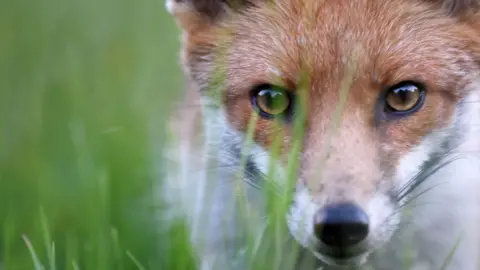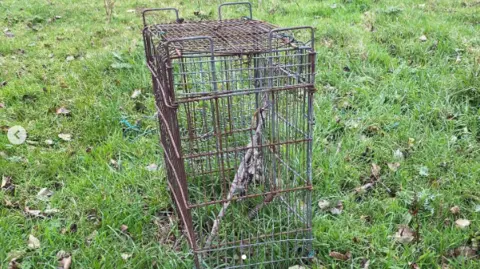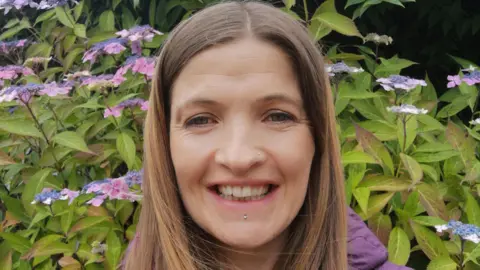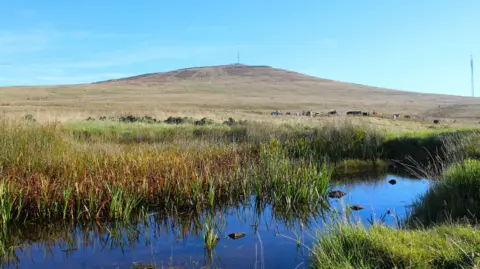Concern over 'cruel' fox traps on Black Mountain
 Getty Images/Peter Clayton Photography
Getty Images/Peter Clayton PhotographyA wildlife conservationist has spoken of his "heartbreak" after finding makeshift fox traps on Belfast's Black Mountain.
Aaron Kelly said the traps were made out of old shopping trollies and hidden on privately-owned land overlooking the city.
One was baited with a dead magpie on a lever which would slam the trapdoor shut behind any hungry small animal which ventured into the snare.
Mr Kelly said he fears hunters were trying to trap foxes alive so they could later throw them to packs of young hunting dogs "to give them a taste for blood".
"What a terrible way to go, and I don't know what sort of human could do that," he told BBC News NI.
"We've done a lot of work to bring wildlife onto this mountain and the last thing we need is any pressure from hunting."
 Black Mountain Rewilding Project
Black Mountain Rewilding Project'It's the last wild place in Belfast'
Mr Kelly founded the Black Mountain Rewilding Project during the first Covid lockdown five years ago.
He started the voluntary initiative by organising weekly litter picks in the area which he said looked "like a dumping site" when the project started.
Since then, he and his fellow volunteers have planted new trees to increase woodland coverage and they regularly engage with the local community to help protect the mountain.
One of the project's successes was attracting a barn owl back to the Belfast hills last year by building nesting boxes.
"What we have up there is very special... it's the last wild place in Belfast," Mr Kelly said.
"All the work we do is just to enhance the habitat and make it a better place for wildlife, so when people come up they actually see wildlife and they can enjoy it."
Allow Instagram content?
The fox traps were discovered "a 10-minute walk apart" when Mr Kelly was patrolling the lower end of the mountain about two months ago.
"It was a rainy day, I was trooping through and I was hoping to find something nice that day and I didn't - I found that and it really disheartened me," he recalled.
Having spent years working with animals, he believes foxes were the target, but said badgers, hedgehogs, birds and even cats and dogs were all at risk from these snares.
A local landowner helped him remove the traps and cameras have since been installed to monitor "areas where this kind of cruelty might occur".
Mr Kelly did not share the photos immediately as he was waiting to see if more traps would be set, but on Thursday he posted photos on Instagram, pleading for an end to the practice.
"Killing an animal is one thing - but leaving it to suffer in fear and pain before dying is something else entirely. And it has no place here," he wrote.
Mr Kelly explained the woman who owns the land where the traps were found is a personal friend, who would be very upset by any form of cruelty to animals.
"She's a great artist and she paints foxes," he said.
"There is no permission to hunt on any of this land."
Animal snares 'are completely inhumane'
 Jo Boylan
Jo BoylanThe traps have been condemned by the Belfast Hills Partnership - a charity which helps to manage about 5,500 hectares of high ground including Black Mountain.
"Snares are actually banned and they are completely inhumane," said the charity's operations manager, Jo Boylan.
"But anti-social behaviours and wildlife crime is unfortunately something that happens across the hills."
The land the partnership advocates for stretches from Carmoney Hil in County Antrim, along the north and west of Belfast city, through to Lisburn.
According to Ms Boylan, 38% of that land is currently open to the public.
 Belfast Hills Partnership
Belfast Hills PartnershipPinpointing crime hotspots in the hills
However, she said the hills suffer from a range of abuse including fly-tipping, badger baiting, persecution of birds of prey and deliberate wildfires.
The partnership works with landowners, public bodies and community groups to record criminal incidents in a central system so they can "pinpoint the hotspots".
"We map wildfires, we map badger setts, we've got a great conservation team here that do quite a lot of survey work and really monitor what is going on in the hills," she explained.
"The more data that we have and the more information that we have, the better that we can protect our hills for the future."
Ms Boylan also praised Mr Kelly for giving up his free time to protect Black Mountain and its inhabitants.
"Aaron actually was one of our youth rangers," she said, explaining the charity runs a training programme for young people who have an interest in the environment.
"He's so passionate about the landscape, he's so passionate about the mountain and he's a good advocate for the wildlife and the hills and its people."
